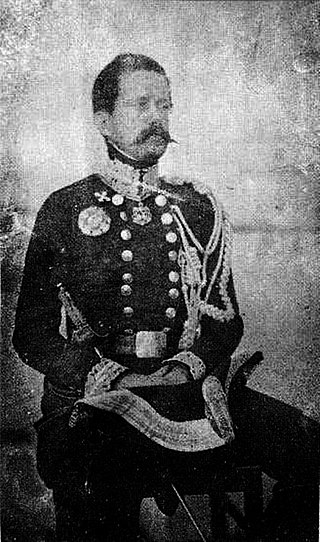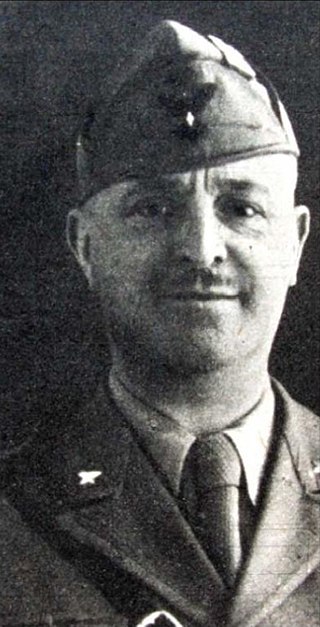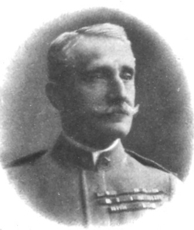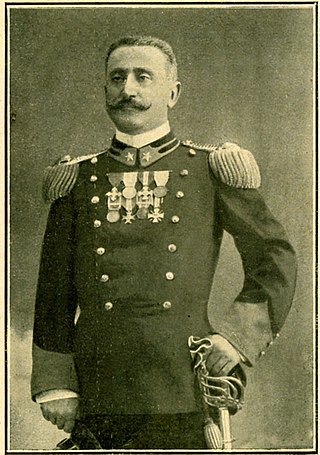Alberto Cavaciocchi | |
|---|---|
 | |
| Born | 31 January 1862 Turin, Italy |
| Died | 3 May 1925 (aged 63) Turin, Italy |
| Occupation | General |
Alberto Cavaciocchi (31 January 1862 - 3 May 1925) was an Italian general and military historian.
Alberto Cavaciocchi | |
|---|---|
 | |
| Born | 31 January 1862 Turin, Italy |
| Died | 3 May 1925 (aged 63) Turin, Italy |
| Occupation | General |
Alberto Cavaciocchi (31 January 1862 - 3 May 1925) was an Italian general and military historian.
Born in Turin, after attending the Military College of Florence Cavaciocchi graduated from the Military Academy of Turin as a second lieutenant of artillery. [1] He later enrolled at the Turin War School, being promoted to the rank of captain in 1888. [1] Promoted to colonel, he led the 60th Infantry Regiment during the Italo-Turkish War, and was decorated with the Cross of Officer of the Military Order of Savoy and the Silver Medal of Military Valor. [1]
During World War I, after some brilliant operations, he was involved in the disastrous Italian defeat in the Battle of Caporetto, when the IV Army Corps he commanded rapidly collapsed. [1] In 1919 the Ministerial Commission of Enquiry established by Francesco Saverio Nitti considered him as one of the most responsible of the defeat and forced him to retire. [1] [2]
Beyond his military activity, Cavaciocchi is known as a researcher and an author of books and journal articles about Italian and European military history. [1] Among his most important works, the reference book Le istituzioni militari del Regno d'Italia ("The military institutions of the Kingdom of Italy", 1906). [1] Between 1906 and 1910 he was chief of the Italian Army History Office, and during this time he oversaw the publication of the official reports of the Risorgimento campaigns and the creation of the journal Memorie storiche militari ("Military Historical Memoirs"). [1]

S.P.A. was an Italian automobile, military vehicle and aero-engine manufacturer founded in Turin by Matteo Ceirano and Michele Ansaldi. It was active between 1906 and 1926. In 1908, it merged with Fabbrica Ligure Automobili Genova (FLAG) and the new company, Società Ligure Piemontese Automobili, was headquartered in Genoa while manufacturing in Turin.

Armando Diaz, 1st Duke della Vittoria, was an Italian general and a Marshal of Italy. He is mostly known for his role as Chief of Staff of the Regio Esercito during World War I from November 1917. He managed to stop the Austro-Hungarian advance along the Piave River in the First Battle of Monte Grappa. In June 1918, he led the Italian forces to a major victory at the Second Battle of the Piave River. A few months later, he achieved a decisive victory in the Battle of Vittorio Veneto, which ended the war on the Italian Front. He is celebrated as one of the greatest generals of the war.

Prince Emanuele Filiberto Vittorio Eugenio Alberto Genova Giuseppe Maria di Savoia, 2nd Duke of Aosta was an Italian general and member of the House of Savoy, as the son of Amadeo I, and was also a cousin of Victor Emmanuel III of Italy. Filiberto was also commander of the Italian Third Army during World War I, which earned him the title of the "Undefeated Duke". After the war he became a Marshal of Italy.

Prince Ferdinando of Savoy, 1st Duke of Genoa was the founder of the Genoa branch of the House of Savoy.

The War Order of Virtuti Militari is Poland's highest military decoration for heroism and courage in the face of the enemy at war. It was created in 1792 by Polish King Stanislaus II Augustus and is the oldest military decoration in the world still in use.

Carlo Geloso was an Italian general during the Second World War. In 1939, he assumed command of the Italian forces in Albania. In 1940, he served as commander of the 11th Army during the Greco-Italian War. He was the commander of the Italian occupation forces in Greece from 1941 to 1943. After Italy joined the Allies, he became a German prisoner-of-war. After the German surrender, he was briefly imprisoned by the Soviets but was released in 1946.

Vincenzo Garioni was an Italian general who saw combat in the Boxer Rebellion, Italo-Turkish War, and World War I. He was the governor of Tripolitania from 1913 to 1914 and later served as the governor of both Tripolitania and Cyrenaica from 1918 to 1919.

Giorgio Cigilana (1857-1919) was an Italian general. He had been the governor of Tripolitania for a short time in 1914.

Antonio Sorice was an Italian general during World War II, Undersecretary for War from February to July 1943 and Minister of War from July 1943 to February 1944.

Alessandro Asinari di San Marzano (1830-1906) was an Italian politician, general, and Senator of the Kingdom of Italy

Giuseppe Andreoli was an Italian general during World War II.

Mario Girotti was an Italian Alpini general during World War II.

Vittorio Camerana was an Italian general who commanded the III Army Corps of World War I. At the end of the war, he was promoted to General of the Army Corps and decorated with the Grand Officer Cross of the Military Order of Savoy.

Luigi Nava (1851-1928) was an Italian General of the Army who participated in the First Italo-Ethiopian War and World War I. He participated in the Italian colonial campaign in the Horn of Africa which lead to his participation at the Battle of Adwa, where he was wounded and taken prisoner by the Abyssinians. Having become Lieutenant General, at the action of the general mobilization of 1915 he was appointed commander of the 4th Army but was dismissed from the command four months after Italy entered the war.
Maurizio Lazzaro de Castiglioni was an Italian general during World War II. From 1940 to 1942 he was head of the Operations Office of the General Staff of the Royal Italian Army. After the war he became commander of the Allied Land Forces Southern Europe in 1951–1952.
Amedeo De Cia was an Italian general during World War II.
Alberto De Agazio was an Italian general during World War II.

Melchiade Gabba was an Italian general during the Fascist period, who served as commander of the Royal Corps of Colonial Troops of Eritrea and Chief of Staff of the East Africa High Command during the Second Italo-Ethiopian War. From 27 July 1943 to 24 February 1944 he was Minister of Italian Africa of the Badoglio I Cabinet. He was also a Senator of the Kingdom of Italy from 1939 to 1944.

Alberto Trionfi was an Italian general during World War II.

Luigi Agliardi was an Italian Major General during the late 19th and early 20th centuries. He was known for his extensive service, participating in the First Italo-Ethiopian War, the Boxer Rebellion and the Italo-Turkish War before his promotion to major general in 1914. He was also known as a figure during the Red Week as he was taken prisoner by the socialists which caused a controversy within his military career.